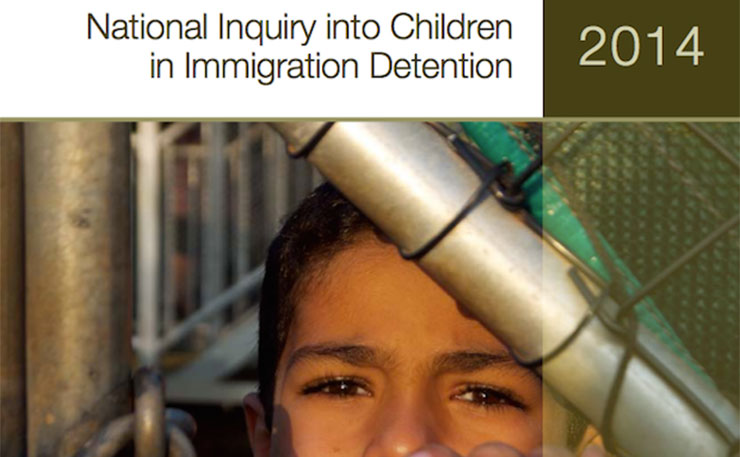As Australia marks Mental Health Week we should stop to remember that it is not only wealthy Australians who are worthy of effective treatment and a lifestyle that is conducive to being mentally healthy. There are too many people whose circumstances foster mental illness who lack the proper support networks for recovery, and who are not lucky enough to have effective mental health treatment: not least the children Australia has incarcerated in immigration detention. It’s time to revisit the Australian Human Rights Commission’s controversial report from last year, The Forgotten Children.
National Mental Health Week aims to “promote social and emotional wellbeing to the community, encouraging people to maximise their health potential.” In past years the media has facilitated a productive discussion about mental illness that engages experts, sufferers and non-sufferers alike. Special events will take place across the country and the national broadcaster will air a series of programs dedicated to the issue.
More than ever, Australians are recognising the seriousness and scale of mental health problems in the community. Accordingly, stigma towards sufferers of chronic mental illness is declining.
Mental illness is a major public health issue in Australia, with around one in five adults being affected by some form of mental disorder every year. It is disproportionately prevalent among certain groups such as those from low socioeconomic backgrounds or who are homeless. Unemployment, isolation, and years of drought means that rural Australians are 66 per cent more likely to commit suicide than those who live in the cities.
Generational disadvantage means that Indigenous mental health remains a grave situation. Aboriginal and Torres Strait Islander young people have a suicide rate five times that of the general population.
The detrimental impact of immigration detention upon children’s development and mental health is well-documented. The Australian Human Rights Commission’s inquiry into children in detention published last year entitled The Forgotten Children, presented a horrific picture of the consequences for children of being detained. Rather than consider its findings, Tony Abbott’s government responded with character assassination and calls for the resignation of the commission’s President, Dr Gillian Triggs.
Their reasons for rejecting the report were obvious. It was methodologically thorough in its illumination of an unjustifiably cruel system. The inquiry accepted almost 250 submissions and interviewed more than 1200 current and former detainees, presenting a bleak picture of how Australia treats those seeking asylum here. More than 34 per cent of children in detention centres have mental health disorders comparable in seriousness to children referred to hospital-based psychiatric services. This is compared to just 2 per cent of Australian children who have disorders this severe.
A submission to the inquiry from the Westmead Children’s Hospital’s refugee and asylum seeker clinic said that more than half of asylum seeker children they treat are suffering from post-traumatic stress. It reported that many children were “deeply traumatised by their time in detention resulting in post-traumatic stress disorder, nightmares and self-harming.”
Associate Professor of Paediatrics at UNSW, Karen Zwi, told a public hearing that in addition to a raft of potential consequent mental illnesses, children who have experienced detention may suffer from “developmental delay”. The practical consequences of developmental stunting were highlighted by the Principal of Holroyd High School, where there is a large asylum seeker population, who stated that “some of the students actually have memory loss.”
These findings are hardly surprising. The parents of child detainees have high levels of emotional distress, with at least one in three adults suffering from mental illness. As the inquiry highlighted, detention is a dangerous place. Between January 2013 and March 2014 there were 233 assaults involving children, 33 incidents of reported sexual assault (most of which involved children), 207 incidents of self-harm and 436 incidents of threatened self-harm.
Australia’s Mental Health Commissioner, Professor Allan Fels, addressed National Press Club in August, urging major reform of Australia’s mental health system. In a persuasive speech, he called upon “political leaders to continue to look beyond health costs to the full burden of mental illness in our society and to give mental health the priority it needs.” He discussed complex policy issues including the need for greater emphasis upon early intervention, primary care and strategies for suicide prevention.
Removing children from detention is not a complex policy issue. It breaches international law including the Convention on the Rights of the Child. This is highlighted repeatedly by the United Nations. Addressing the longer-term mental health consequences of prolonged detention of children and young people will prove more challenging. Any major mental health reform effort as advocated by Professor Fels must consider the ongoing and future needs of this vulnerable cohort.
Donate To New Matilda
New Matilda is a small, independent media outlet. We survive through reader contributions, and never losing a lawsuit. If you got something from this article, giving something back helps us to continue speaking truth to power. Every little bit counts.




